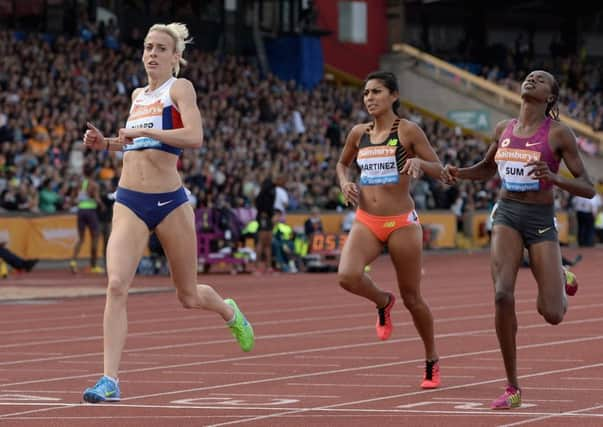Holmes’ record a realistic target for Lynsey Sharp


Sharp’s victory in 1min 59.14sec was the outstanding British performance in the Sainsbury’s Birmingham Grand Prix Diamond League meeting, emphasising her burgeoning self-confidence and tactical versatility. “My sister texted me before the race to say, ‘Remember you’re a different athlete now than you were the last time you raced those girls’,” said Sharp, who is scheduled to undergo a third and hopefully last operation next month to clear up the problems caused by what was initially a minor leg injury. “It was hard to pick up after the Europeans again, but I just stuck to what my coach told me.”
Known earlier in her career for sitting back and striking late, Sharp took silver in the European Championships two weeks ago after leading from the front. Yesterday she tucked in behind Sum for much of the race, and kept her composure when America’s Brenda Martinez moved ahead of her to challenge for the lead some 200m from home.
Advertisement
Hide AdAdvertisement
Hide Ad“The plan was to go out strong but not lead, then just kick with 120 to go,” she explained. “When Brenda came up on me I just said to myself, ‘Don’t panic – just keep in contact then kick’, because I knew I had that extra gear.” The 24-year-old Scot will be out of action for anywhere between six weeks and four months after her operation to get rid of a small abscess within the surgery area. “The operation is due at the end of September, but I don’t have a date – I’m putting it off. It’s frustrating because I’m in good shape and it’s not stopping me from running.
“In May I didn’t even know if I was going to make the Scottish team for the Games. My aim then was pretty much to run 2:02 and make the team. I ran 2:06 in my first race of the season, so to run a Scottish record and win silver medals at the Commonwealths and Europeans has been a total dream.”
Having dropped her personal best from above two minutes to 1:58.80 this season despite very limited preparation, Sharp now looks set to challenge Kelly Holmes’ British record of 1:56.21 over the next couple of years.
“Kelly’s British record is obviously still a long way off – there’s a big difference between my 1:58.80 and her 1:56.21. Times will come and I love championship racing. To medal at the worlds in 2015 and the Olympics in 2016 is probably the aim.
“But people have started to talk about that British record and it is definitely an aim. What I’ve run now is still only eighth [in Britain] all time, so it just shows you the quality of British 800m running. I didn’t realise my 1:58.80 was the fastest since 2011.”
Sum was second in 1:59.42, 12 100ths of a second ahead of America’s Martinez. Scotland’s Laura Muir was fourth, partially compensating for a disappointing season with a personal best of 2:00.67. “I’m very happy, because that field was very strong,” said Muir. “I just had to run my own race and run even splits as I haven’t got the same speed as the other girls. I knew I’d be strong over that last 200m.
“It’s good to have got a PB in both the 1,500 and 800 this year, so I can’t complain. The [British] girls are all really strong at the moment and that spurs us all on to be even better.”
Eilidh Child renewed her rivalry with Commonwealth champion Kaliese Spencer in the 400m hurdles, and the result was the same as in Glasgow, the Jamaican ahead of the Scot. But this time, Child had at least half an eye on next season’s world championships, as she experimented with the aim of getting closer to her great rival.
Advertisement
Hide AdAdvertisement
Hide Ad“The plan today was to try out a new stride pattern,” the European champion said after crossing the line in 54.89. “We felt at the Europeans I was a bit on top of a few hurdles, but I didn’t want to risk anything there.
“So I went out and tried it. It worked pretty much until hurdle six, then I lost it a little bit at eight and nine. But it was good to try it, and I’ll try it again in Brussels. We’re trying this new pattern because we feel in my first five hurdles I’m always there in amongst it if not ahead. But it’s at the top bend where the top girls like Kaliese all make a surge on me, so we’ve been working on trying to change that a little bit. I can try it again in a couple more races and hopefully that will set me up for next year and I can get that bit closer to them. I’ve got the Brussels Diamond League and then the Intercontinental Cup, so that will be two big races again that I can go out and get a bit more experience.
“The season has gone so well, and that’s the nice thing – I can come to the Diamond League and experiment now, whereas before I always had to make sure I nailed that race. I think I’ve come on a lot as a hurdler.”
In the IPC Grand Prix final, T44 athlete Stef Reid was third in a mixed-classification long-jump event. The Scot’s leap of 5.26cm was the longest, but T42 competitor Vanessa Low of Germany won with 4.60 – a world record for her class.